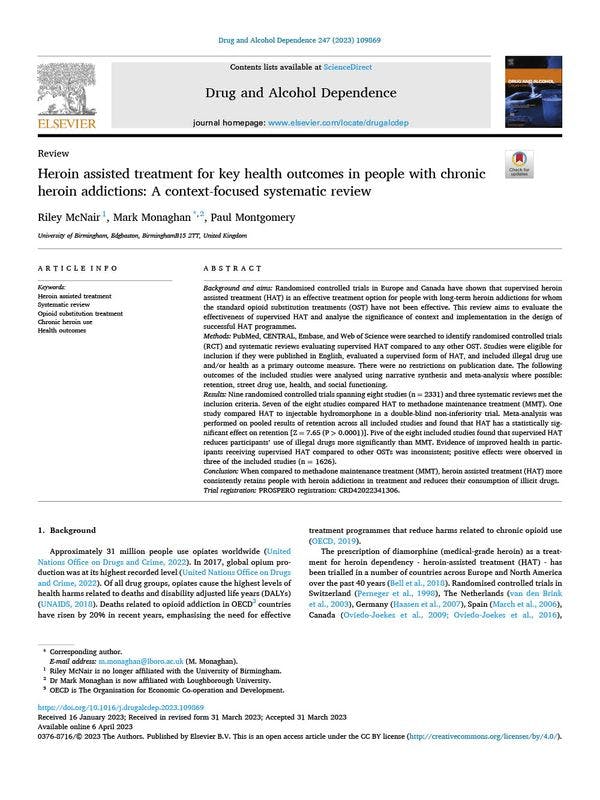Traitement de substitution à base d'héroïne pour des résultats essentiels en matière de santé chez les personnes souffrant d'une dépendance chronique à l'héroïne : Une revue systématique centrée sur le contexte
McNair et al. concluent que le traitement de substitution à base d'héroïne réduit la dépendance à l'égard des drogues vendues dans la rue et favorise la poursuite du traitement. Pour en savoir plus, en anglais, veuillez lire les informations ci-dessous.
Highlights
- Heroin assisted treatment reduces patients’ use of street drugs.
- Diamorphine retains chronic heroin users in opioid substitution treatment.
- Context can affect the successful implementation of heroin assisted treatment programmes.
Abstract
Background and aims
Randomised controlled trials in Europe and Canada have shown that supervised heroin assisted treatment (HAT) is an effective treatment option for people with long-term heroin addictions for whom the standard opioid substitution treatments (OST) have not been effective. This review aims to evaluate the effectiveness of supervised HAT and analyse the significance of context and implementation in the design of successful HAT programmes.
Methods
PubMed, CENTRAL, Embase, and Web of Science were searched to identify randomised controlled trials (RCT) and systematic reviews evaluating supervised HAT compared to any other OST. Studies were eligible for inclusion if they were published in English, evaluated a supervised form of HAT, and included illegal drug use and/or health as a primary outcome measure. There were no restrictions on publication date. The following outcomes of the included studies were analysed using narrative synthesis and meta-analysis where possible: retention, street drug use, health, and social functioning.
Results
Nine randomised controlled trials spanning eight studies (n = 2331) and three systematic reviews met the inclusion criteria. Seven of the eight studies compared HAT to methadone maintenance treatment (MMT). One study compared HAT to injectable hydromorphone in a double-blind non-inferiority trial. Meta-analysis was performed on pooled results of retention across all included studies and found that HAT has a statistically significant effect on retention [Z = 7.65 (P > 0.0001)]. Five of the eight included studies found that supervised HAT reduces participants’ use of illegal drugs more significantly than MMT. Evidence of improved health in participants receiving supervised HAT compared to other OSTs was inconsistent; positive effects were observed in three of the included studies (n = 1626).
Téléchargements
Régions
Profils associés
- Drug and Alcohol Dependence
